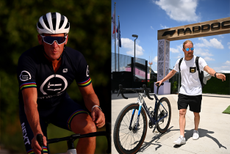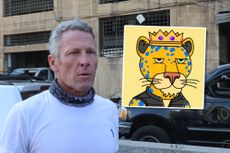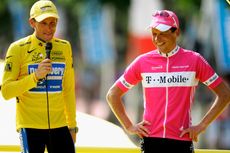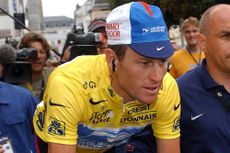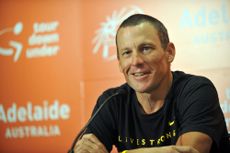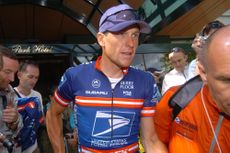Lance Armstrong

Nationality: American
Date of birth: September 18, 1971
Height: 177cm
Weight: 75kg
Team: Retired
Previous teams: Motorola (1992-1996), Confidis (1997), US Postal Service (1998-2005), Astana (2009), Team RadioShack (2010-2011)
Twitter: @lancearmstrong
Lance Armstrong is probably the most controversial figure in cycling. The American rider enjoyed almost a decade of glory, winning seven consecutive editions of the Tour de France, from 1999 to 2005. Since he acquired a lifetime ban from cycling, and seeing all of his results back to August 1998 voided, his name has become synonymous with doping.
Following investigation by the United States Anti-Doping Agency (USADA), Armstrong was stripped of his most prestigious titles in October 2012 – finally admitting doping in an interview with Oprah Winfrey in January 2013.

Armstrong began his sporting career is a swimmer, transferring his skills to triathlon at the age of 16, to become the national sprint course triathlon champion in 1989 and 1990 at the ages of 18 and 19. He signed his first contract as a professional cyclist in 1992, with the Motorola team.
In his early career, Armstrong was known for his success at one-day races – taking the honours at 10 events in 1993, including the National Championship Road Race, and the UCI World Championship Road Race, as well as stage eight of the Tour de France.
In 1996, Armstrong was forced to take a break from racing having been diagnosed with testicular cancer. Following his recovery, he set up the Livestrong Foundation to provide support for those affected by cancer. In 1998, Armstrong made a comeback – to great success.
On his return to professional racing, the 27-year-old joined up with the US Postal/Discovery team. Before this point, he had competed in the Tour de France just four times, winning two stages. In 1998, he was fourth in the Vuelta a España, and in 1999 he won his first of seven Tour de France races.
That first year, he finished 7 minutes 37 seconds ahead of second place rider Alex Zülle, and in 2000 he finished 6 minutes 2 seconds in front of Jan Ullrich.
The winning streak continued to 2005, when Armstrong retired – only to return to racing with Astana in 2009, a year in which finished the Tour de France in third place and retired again for the final time in 2011 following the Tour Down Under in Australia. He competed in triathlons in 2012 - a sport he may still continue to explore, now aged 45.
Doping allegations began after Armstrong’s first Tour success in 1999; though he denied any suggestion of wrongdoing, the allegations never went away. In 2004 two reporters - Pierre Ballester and David Walsh - published a book on their findings, titled LA Confidentiel – Les secrets de Lance Armstrong.
Sections from the book were published in the Sunday Times – prompting Armstrong to sue the paper for libel. In 2005, when more evidence appeared against the rider, the paper considered recouping their losses from the settlement and court costs – eventually filing a case against Armstrong in 2012 for $1.5 million and reaching an undisclosed settlement.

In 2010, Armstrong’s former teammate Floyd Landis admitted to doping offences, also claiming that other riders had been involved. Investigations continued, and in 2012 a USADA report – totalling 1000 pages - came to the conclusion that Armstrong had used performance-enhancing drugs over the course of his career.
Armstrong was named as the ringleader of “the most sophisticated, professionalized and successful doping program that sport has ever seen.” The UCI upheld the USADA report and Armstrong received a lifetime ban from the sport. In October 2015, a film documenting Armstrong's life in cycling - The Program - was released, with actor Ben Foster playing the leading role.
Legal action is still on-going, and Armstrong faces a $100m (£79m) lawsuit in November. The case has been brought against Armstrong and Tailwind Sports, the company that owned the US Postal Team, by Landis and the US Justice Department, accusing them of defrauding the government out of funds. Armstrong claims he will be left ‘out on the street’ if the case goes against him.
Latest
-

Will another cyclist ever follow Lance Armstrong onto a Wheaties box?
USA Cycling is optimistic about the ‘strongest US men’s presence in Europe’ in nearly two decades with contenders for future Tour de France race.
By Anne-Marije Rook Last updated
-

Eight of the best cycling films streaming on Netflix, Amazon Prime, Disney+ and iPlayer
The best cycling-related films and documentaries available to watch online
By Tom Thewlis Last updated
-

F1 star Valtteri Bottas spotted out riding with Lance Armstrong
Alfa Romeo driver joined controversial American for Colorado spin on Sunday
By Adam Becket Published
-

'I think doping might actually be more popular': Mixed reviews as Lance Armstrong gets into the NFT game
If there's one thing worth reading this weekend, it's the replies to Lance Armstrong's tweet about acquiring an NFT
By Jonny Long Published
-

'I was almost dead': Jan Ullrich speaks out on his recovery on Lance Armstrong's podcast
The former Tour de France winner spoke about how finding friends in Armstrong and others after re-adopting a healthy lifestyle
By Tim Bonville-Ginn Published
-

"There is potential for redemption for Lance Armstrong" says Brian Cookson
UCI president says that there is a potential way back for anyone in cycling if they're willing to cooperate
By Richard Windsor Published
-

Even now Lance Armstrong is still working miracles
Comment: "In the courts, as it was in his professional career, Armstrong has found himself protected, inadvertently perhaps, by the fact that his success served to benefit many people"
By Vern Pitt Published
-

Lance Armstrong subpoenas those who testified against him
Lance Armstrong's lawyers want those who testified against him in his doping case to appear in court as he fights $100m whistleblower lawsuit
By Gregor Brown Published
-

Lance Armstrong to face trial in $100m lawsuit in November
A date has been set for the trial in a $138m lawsuit brought against Lance Armstrong by former team-mate Floyd Landis and the US Justice Department.
By Henry Robertshaw Published



